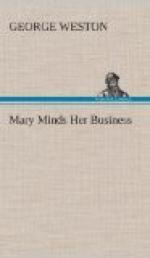“Somebody’s been here—snooping,” she thought. “Somebody with a key to the desk. He must have had a cigarette in his hand when he shut the drawer, and the ashes jarred off without being noticed—”
Irresistibly her thoughts turned to Burdon Woodward, with his gold cigarette case and match box.
“It was he who gave me the keys,” she thought.
She sighed. A sense of walking among pitfalls took possession of her. As you have probably often noticed, suspicion feeds upon suspicion, and as Mary walked through the outer office she felt that more than one pair of eyes were avoiding her. The old cashier kept his head buried in his ledger and nearly all the men were busy with their papers and books.
“Perhaps it’s because I’m a woman,” she thought. Ma’m Maynard’s words arose with a new significance, “I tell you, Miss Mary, it has halways been so, and it halways will. Everything that lives has its own natural enemy—and a woman’s natural enemy: eet is man!”
But Mary could still smile at that.
“Take Mr. MacPherson,” she thought; “how is he my natural enemy? Or Judge Cutler? Or Archey Forbes? Or Wally Cabot?” She felt more normal then, but when these reflections had died away, she still occasionally felt her thoughts reverting to Mac’s warning, the cigarette ash, the averted glances in the office.
The nest morning, though, she thought she had found the answer to the latter puzzle. She had hardly finished breakfast when Judge Cutler was announced, his hawk’s eyes frowning and never a trace of his smile.
“Did you get your copy of the annual report?” he asked.
“Not yet,” said Mary, somehow guessing what he meant. “Why?”
“I got mine in the mail this morning.” He drew it from his pocket and his frown grew deeper. “Let’s go in the den,” he said; “we’ve got to talk this out.”
It was the annual report of Spencer & Son’s business and briefly stated, it showed an alarming loss for the preceding twelve months.
“Ah-ha!” thought Mary, “that’s the reason they didn’t look up yesterday. They had seen this, and they felt ashamed.”
“As nearly as I can make it out,” said the judge, “there’s too many improvements going on, and not enough business. We must do something to stop these big expenses, and find a way to get more bearings sold—”
He checked himself then and looked at Mary, much as Mac had looked the previous day, just before issuing his warning.
“Perhaps he’s thinking of Uncle Stanley, too,” thought Mary.
“Another bad feature is this,” continued the judge, “the bank is getting too strong a hold on the company. We must stop that before it gets any worse.”
“Why?” asked Mary, looking very innocent.
“Because it isn’t good business.”
“But Uncle Stanley is president of the bank. You don’t think he’d do anything to hurt Spencer & Son; do you?”




